★½
“Now we know. We just don’t care…”
 This is probably the first WWF bio from a wrestler who never won the world title. Yet Chyna made her mark, largely through her abandoning the T&A of the women’s division, to take on the likes of Triple H and Stone Cold. This would seem to be an interesting angle, from which to report. So why is the result so goddamn…well, whiny? Part of the problem is that any wrestle-bio has to compete with the genius which was Mick Foley’s first book, Have a Nice Day – for insight and sheer good humour, it’s almost impossible to beat. Yet that doesn’t mean you shouldn’t bother trying. Chyna, on the other hand, runs out little more than a “woe is me!” tale about what a horrible life she had, all the way from her childhood, up until the WWF plucked her from obscurity to make her a star.
This is probably the first WWF bio from a wrestler who never won the world title. Yet Chyna made her mark, largely through her abandoning the T&A of the women’s division, to take on the likes of Triple H and Stone Cold. This would seem to be an interesting angle, from which to report. So why is the result so goddamn…well, whiny? Part of the problem is that any wrestle-bio has to compete with the genius which was Mick Foley’s first book, Have a Nice Day – for insight and sheer good humour, it’s almost impossible to beat. Yet that doesn’t mean you shouldn’t bother trying. Chyna, on the other hand, runs out little more than a “woe is me!” tale about what a horrible life she had, all the way from her childhood, up until the WWF plucked her from obscurity to make her a star.
If she’d paid her dues, I might have more sympathy, but there’s hardly any info on her (apparently brief) time as an indie wrestler. You get a fair bit on the training at Killer Kowalski’s school, but otherwise, you can’t help wondering if there are any number of other women who are more deserving of the chances she’s had (Intercontinental Champion! Playboy centrefold!) and wouldn’t complain about everything so much. Hell, she could always go back to her planned career as an air-hostess – indeed, this might yet be her best option if she doesn’t meet with success outside the WWF soon, and that’s something notable by its absence since her departure. What insights there are come from other people e.g. WWF heavyweight champ (at time of writing) Chris Jericho, who says, “Women’s wrestling is kind of dead in the States almost. In Japan, it’s awesome”, though subsequent comments about “porky, chubby lesbians” may merit a visit from Manami Toyota and Mima Shimoda.
But the best quote comes from Luna, daugher of Maurice ‘Mad Dog’ Vachon: “We’re shit-out-of-luck. We’re not strippers. We’re not bimbos. We’re not empty-headed females. We like this sport. We love to entertain. We didn’t want to be in this sport to be close to men – we got in this sport because we love wrestling. But SOL, baby. You know what the men have done to us? Besides paying us tons less than the men, objectifying us into eye candy, T&A, the little wet dream for the little weenies? They turned us on each other… And the real bitch is, you try and get tough, you show ’em you’re into the moves and counter-moves and that you can take a dive off the top rope as good as any of them, they start calling you a man, a dyke, a ‘roid junkie, a muffin diver, all that crap. SOL, Joanie, SOL.” This is far more honest and to the point than anything Chyna comes up with – any chance of Luna writing a book?
By: Chyna
Publisher: Harper-Collins, 2001, $26.00





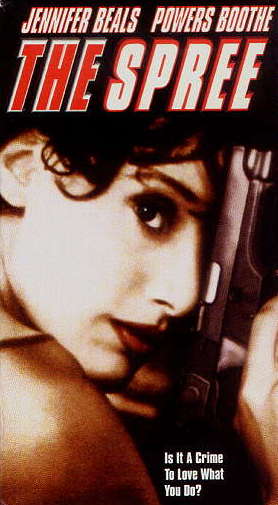 Good films about women burglars are hard to come by, for some reason. Mind you, good films about
Good films about women burglars are hard to come by, for some reason. Mind you, good films about 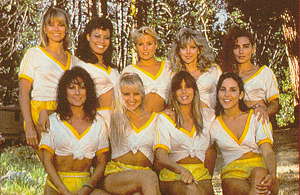 I guess Blood Sport was already taken? It’s softball beauties vs. rednecks after: a) the visiting ladies thump the home side 17-2, b) the team owner has to extract his fee at gunpoint, and c) the gals resist – forceably – the crude advances of the locals. Before you can say, “duelling banjos”, they’re being pursued through the woods, and picked off one by one.
I guess Blood Sport was already taken? It’s softball beauties vs. rednecks after: a) the visiting ladies thump the home side 17-2, b) the team owner has to extract his fee at gunpoint, and c) the gals resist – forceably – the crude advances of the locals. Before you can say, “duelling banjos”, they’re being pursued through the woods, and picked off one by one.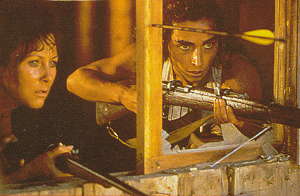 Playing Babe, daughter of team owner Ross Hagen, Laura Albert is about the only one of the girls to make any impression as a character; she’d go on to become a stuntwoman, working on the like of Starship Troopers. The rest of her colleagues take showers, get assaulted (a sequence verging on the nastily gratuitous), die, turn psycho and take revenge, all without exhibiting any significant personality traits. Quite an achievement in itself. Another one of those movies which will put you off going to rural, Southern parts of America.
Playing Babe, daughter of team owner Ross Hagen, Laura Albert is about the only one of the girls to make any impression as a character; she’d go on to become a stuntwoman, working on the like of Starship Troopers. The rest of her colleagues take showers, get assaulted (a sequence verging on the nastily gratuitous), die, turn psycho and take revenge, all without exhibiting any significant personality traits. Quite an achievement in itself. Another one of those movies which will put you off going to rural, Southern parts of America. This comes from Vista Street Entertainment, whom you might remember produced some of the worst entries in the
This comes from Vista Street Entertainment, whom you might remember produced some of the worst entries in the  If I ever become an evil overlord, I will conduct thorough background checks on all entrants to my martial arts tournament, to ensure they are not related to anyone I may previously have had killed. I will also teach my guards that if a prisoner is apparently not in his cell, they will use mirrors to examine all its corners, rather than rushing in and allowing him to drop from the ceiling onto them.
If I ever become an evil overlord, I will conduct thorough background checks on all entrants to my martial arts tournament, to ensure they are not related to anyone I may previously have had killed. I will also teach my guards that if a prisoner is apparently not in his cell, they will use mirrors to examine all its corners, rather than rushing in and allowing him to drop from the ceiling onto them. Worthy of note as one of the first pieces of anime made available to an English-speaking audience, (not long after its original 1985 Japanese release), BGC is set in 2032, when Tokyo has been rebuilt, post-earthquake. The Genom corporation are fiddling with Boomers, biomechanical robots of immense strength but with a nasty tendency to run amok. Standing guard are a mysterious team, the Knight Sabers, with their own technological strengths, who alternate between merc work and more altruistic concerns.
Worthy of note as one of the first pieces of anime made available to an English-speaking audience, (not long after its original 1985 Japanese release), BGC is set in 2032, when Tokyo has been rebuilt, post-earthquake. The Genom corporation are fiddling with Boomers, biomechanical robots of immense strength but with a nasty tendency to run amok. Standing guard are a mysterious team, the Knight Sabers, with their own technological strengths, who alternate between merc work and more altruistic concerns.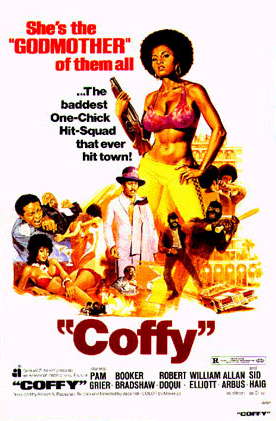 Neither star Grier nor director Hill were exactly strangers to the world of exploitation when they made this, but their combination here created a whole new subgenre, crossing action heroineism with black cinema. Following her would come Foxy Brown, Cleopatra Jones and the rest, but let it be said, Coffy was the first of any significance.
Neither star Grier nor director Hill were exactly strangers to the world of exploitation when they made this, but their combination here created a whole new subgenre, crossing action heroineism with black cinema. Following her would come Foxy Brown, Cleopatra Jones and the rest, but let it be said, Coffy was the first of any significance.
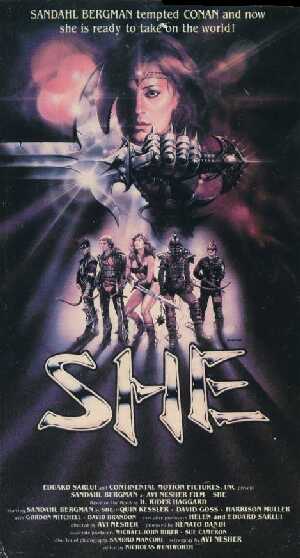 Proof positive that a lack of narrative coherence is no barrier to a good time, She makes about as much sense as you’d expect from a film where the soundtrack veers wildly from Rick Wakeman to Motorhead. It’s post-apocalyptic sword and sorcery, with Bergman as She, the immortal goddess ruling a tribe of Amazon warriors. For reasons which are never explained, She ends up tagging along with hero Tom as he searches for his kidnapped sister. Hey, even Immortal Goddesses need some time off, I guess.
Proof positive that a lack of narrative coherence is no barrier to a good time, She makes about as much sense as you’d expect from a film where the soundtrack veers wildly from Rick Wakeman to Motorhead. It’s post-apocalyptic sword and sorcery, with Bergman as She, the immortal goddess ruling a tribe of Amazon warriors. For reasons which are never explained, She ends up tagging along with hero Tom as he searches for his kidnapped sister. Hey, even Immortal Goddesses need some time off, I guess. One of the primary rules of exploitation cinema, is never to trust a movie with painted box-art. And, verily, no scene like the picture at right occurs in the film. Indeed, the whole film is sold on sizzle rather than steak, and will probably leave you feeling more than a little hungry. Verrell looks the part, though her slicked-back hair is rather too cliched and obvious, and she does appear to be doing her own action. Her lack of acting ability is painfully obvious, however, and Santiago is wise to keep her dialogue to a minimum.
One of the primary rules of exploitation cinema, is never to trust a movie with painted box-art. And, verily, no scene like the picture at right occurs in the film. Indeed, the whole film is sold on sizzle rather than steak, and will probably leave you feeling more than a little hungry. Verrell looks the part, though her slicked-back hair is rather too cliched and obvious, and she does appear to be doing her own action. Her lack of acting ability is painfully obvious, however, and Santiago is wise to keep her dialogue to a minimum.